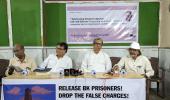The Nagpur bench of the Bombay high court on Tuesday refused bail to advocate Surendra Gadling in connection with a 2016 Surjagarh iron ore mine arson case, noting that prima facie the accusations against him are true.

Photograph: PTI Photo
On December 25, 2016, Maoists allegedly set ablaze 76 vehicles that were being used for transporting iron ore from Surajgarh mines in Maharashtra's Gadchiroli.
A division bench of Justices Vinay Joshi and Valmiki SA Menezes, in the judgment, noted that perusal of the material submitted by the prosecution shows reasonable ground to believe that the accusations against Gadling are "prima facie true".
"We have arrived at the prima facie conclusions of the involvement of the appellant (Gadling) in the organisation of the Surjagarh incident and his membership of the banned organisation Communist Party of India-Maoist," the HC said.
The bench in its order noted that the assailants were acting with a common intent to create terror not just in the minds of drivers of the trucks (which were set ablaze), but with an intent to stop the working of the mining activity in that area, which would result in a threat to the economic security as also the security of the factory set up in that area.
"Prima facie, therefore, the acts alleged in the complaint/FIR, would be acts, which would squarely fall within the definition of the word 'terrorist act'," it said.
The high court further held that an analysis of the hard disk seized from Gadling's house would leave no doubt that he was connected with the banned organisation, CPI-Maoist.
Referring to letters written by other accused in the case, the court said it clearly reveals that Gadling was not just engaged as an advocate of some of the members of the banned organisation, but he was involved in raising finance and moving money from place to place and providing financial support to the cadre of the CPI-Maoist in the area of Gadchiroli.
The court said if contents of the letters are proved finally against Gadling, then it would demonstrate that he was indeed a member of the banned outfit.
"...and he was involved at its organisational level both in terms of arranging its funding in the areas of Gadchiroli and Bastar and also involved in the organisation of the cadre to wage war against the 'enemy', which is the State," the HC said.
The court said the allegations levelled against Gadling of being part of a conspiracy and abetting the commission of terrorist acts, as also having direct membership of the CPI-Maoist are prima facie to be true.
Gadling is accused of providing aid to Maoists, who were working at the ground level and for entering into a conspiracy with various co-accused and absconding accused in the case, and was involved in the Surjagarh incident.
He has been booked under various provisions of the Unlawful Activities Prevention Act and Indian Penal Code.
The prosecution had claimed that Gadling provided secret information about government activities and maps of certain areas to the underground Maoists in order to prompt them into violent acts.
Gadling is also accused of having directed underground Maoists to oppose the operation of Surjagarh mines and instigated them to join the CPI (Maoist) movement and to get involved in the activity of stopping the work of Surjagarh mines.
In his appeal, Gadling had claimed innocence and said he was targeted by the police machinery and that he was being implicated in the case.
His advocate Firdos Mirza had argued that there was no evidence against Gadling.
Gadling had filed the appeal after the trial court rejected his bail plea.
He is also an accused in the Elgar Parishad-Maoist links case, pertaining to alleged inflammatory speeches delivered at the Elgar Parishad conclave held in Pune on December 31, 2017, which police claimed triggered violence the next day near the Koregaon-Bhima war memorial in Pune district.











 © 2025
© 2025